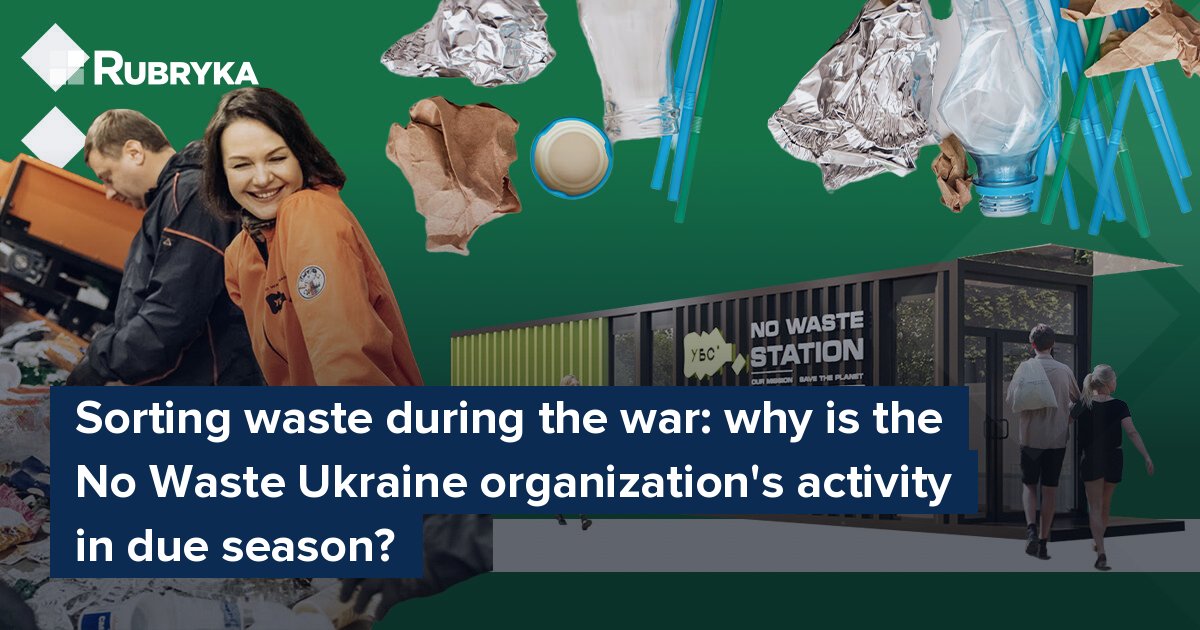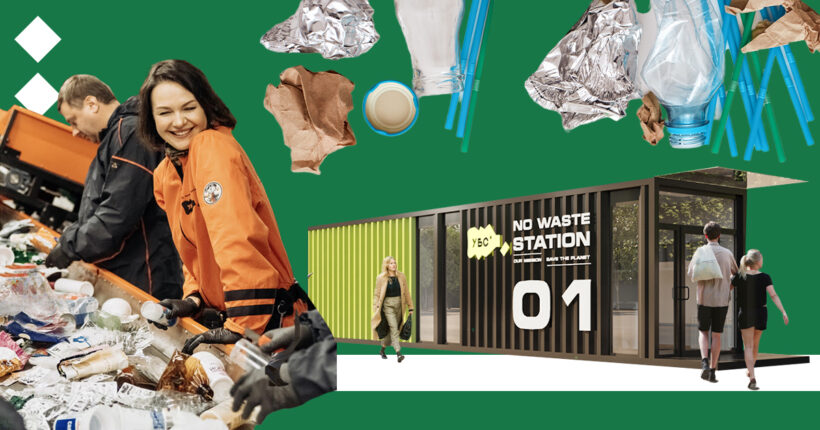
What is the problem?
Ukraine's waste sorting and processing industry has always needed significant upgrades, both from the government and on a personal level. But despite this, the No Waste Ukraine (NWU) project was able to attain outstanding results.
NWU is an organization that works in the sphere of waste management, creates spaces for sorting, and sends collected waste for processing. It has two sorting stations in Kyiv, which are both educational and cultural spaces. The large station is located in Kyiv on Saperno-Slobidska Street, 25/4 (Demiivska metro station), and the capsule station is located on the territory of the Forum Business Center (Pymonenko Street, 13, Lukianivska metro station).
After the Russian Federation started its full-scale aggression, of course, the work became harder. Eco-activist, social entrepreneur, and founder of NWU Yevhenia Aratovska told Rubryka about the difficulties NWU faced and how it managed to handle them.
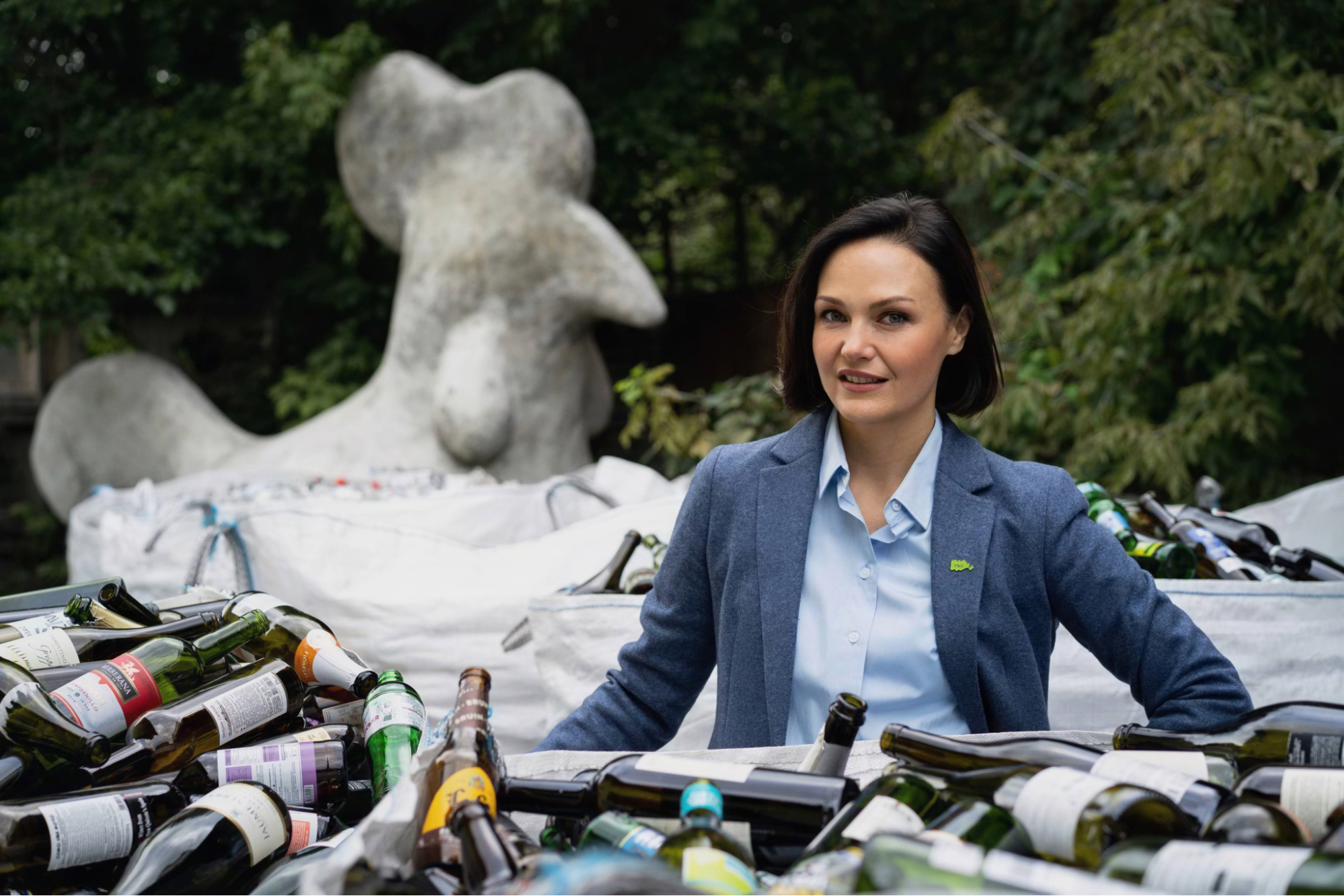
Eco-activist, social entrepreneur, and founder of NWU Yevhenia Aratovska
Yevhenia shared that after the start of a full-scale war, there were thoughts of halting all the projects completely. The station stopped working for three months. However, after the first shock, it was started again. When the space reopened in May, it faced new challenges, including:
- a financial burden on rent and salary;
- personnel numbers dropping since many went overseas to western Ukraine or joined the military;
- reduction of people's activity regarding sorting;
- shortage of people to occupy management positions;
- and a massive decline in donations.
Despite facing multiple hurdles, Rubryka discovered the secrets of how the organization not only made it through the war but also achieved greater success. What was done about this? Read on to find out.
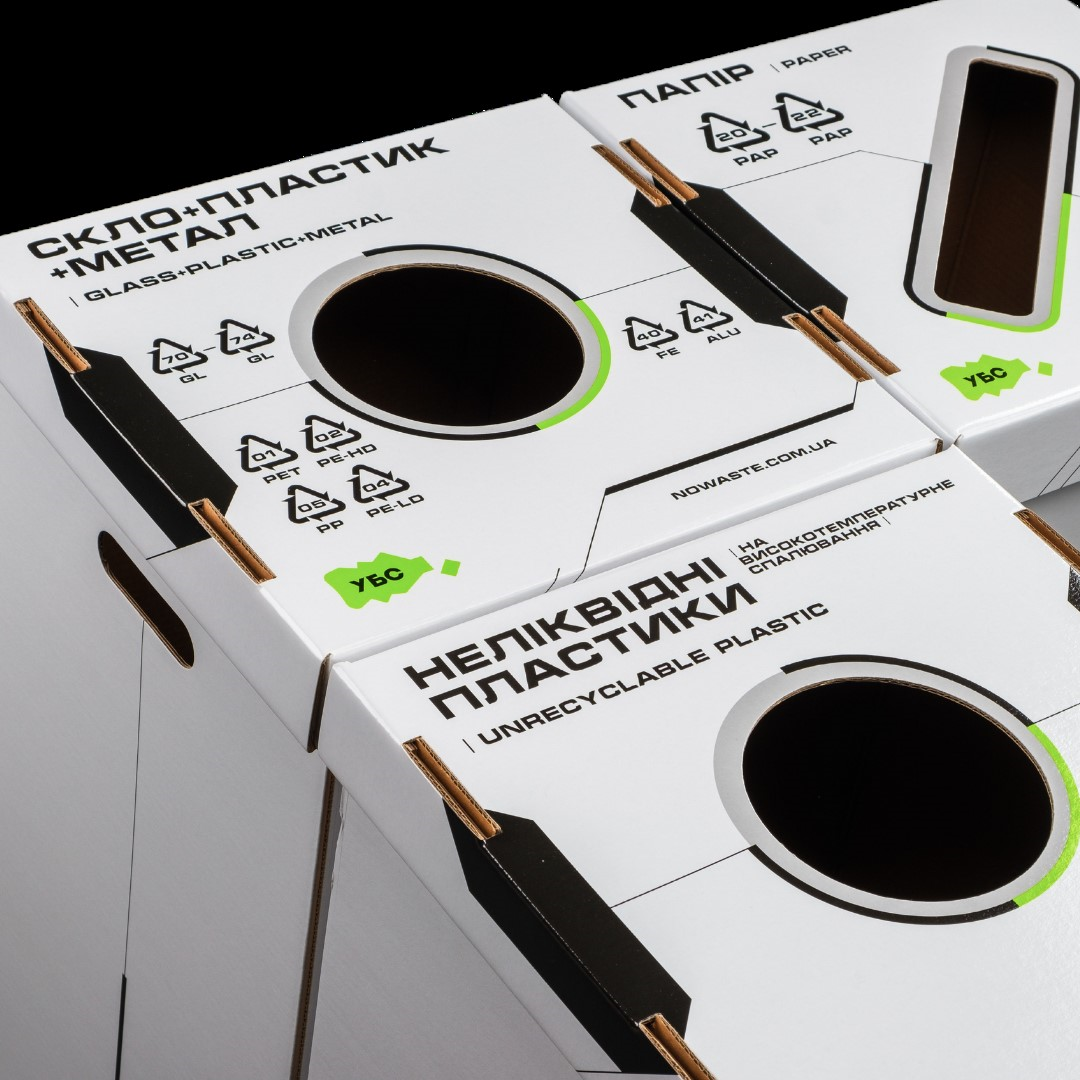
NWU containers, which are available in the assortment. Photo provided by NWU
What is the solution?
A sewing shop, medicine purchase, four feed trucks, and a customer service chatbot
The station wasn't operational for the first three months of the full-scale war. Nevertheless, plenty of activity was going on in the form of volunteer work.
"We got humanitarian food at the station – mostly animal feed. Our ladies unloaded four trucks and gave them to the volunteers who showed up. So, we took care of the whole process – getting the trucks, unloading them, writing reports, sorting, and providing assistance- that happened every day. There was also food for birds, cats, kittens, and even fish. They all worked on this for about a month," Yevhenia remembers.
A team of NWU managers also set up a chatbot to offer help.
"We had a good grasp of the humanitarian headquarters in Kyiv – who had them and what they had. Some had medicine; some had food; some had clothes and baby diapers – we guided people towards them if they could no longer get what they needed from the store. We even went as far as a trip to the Chernihiv region to deliver some of what was needed. Our management team was in charge of responding to all the requests," Ms. Yevhenia recalls.
Thanks to the partnership with the "People in Need" international fund, it was possible to agree on financial assistance to purchase two large batches of medicines, which is more than 800 thousand hryvnias. Evhenia Aratovska explains:
"Then we bought medicines, which immediately became scarce, from "Darnytsia" and "Farmak"[pharmaceutical companies – ed.] in order, first of all, to support Ukrainian manufacturers, because in this way we also support their activities and their employees. Secondly, we directed these medicines to civilian hospitals that needed them the most — in Kyiv, Kharkiv, Kyiv, Kharkiv, and Chernihiv regions."
Evhenia said it was possible to get medicine for people with diabetes, but it flew right off the shelves. These medications are an absolute necessity for those with diabetes, or else they won't be able to survive.
"We handed over a batch of such insulin preparations. The lead doctor was taken aback, and it really touched them [people with diabetes – ed.]," Yevhenia remembers.
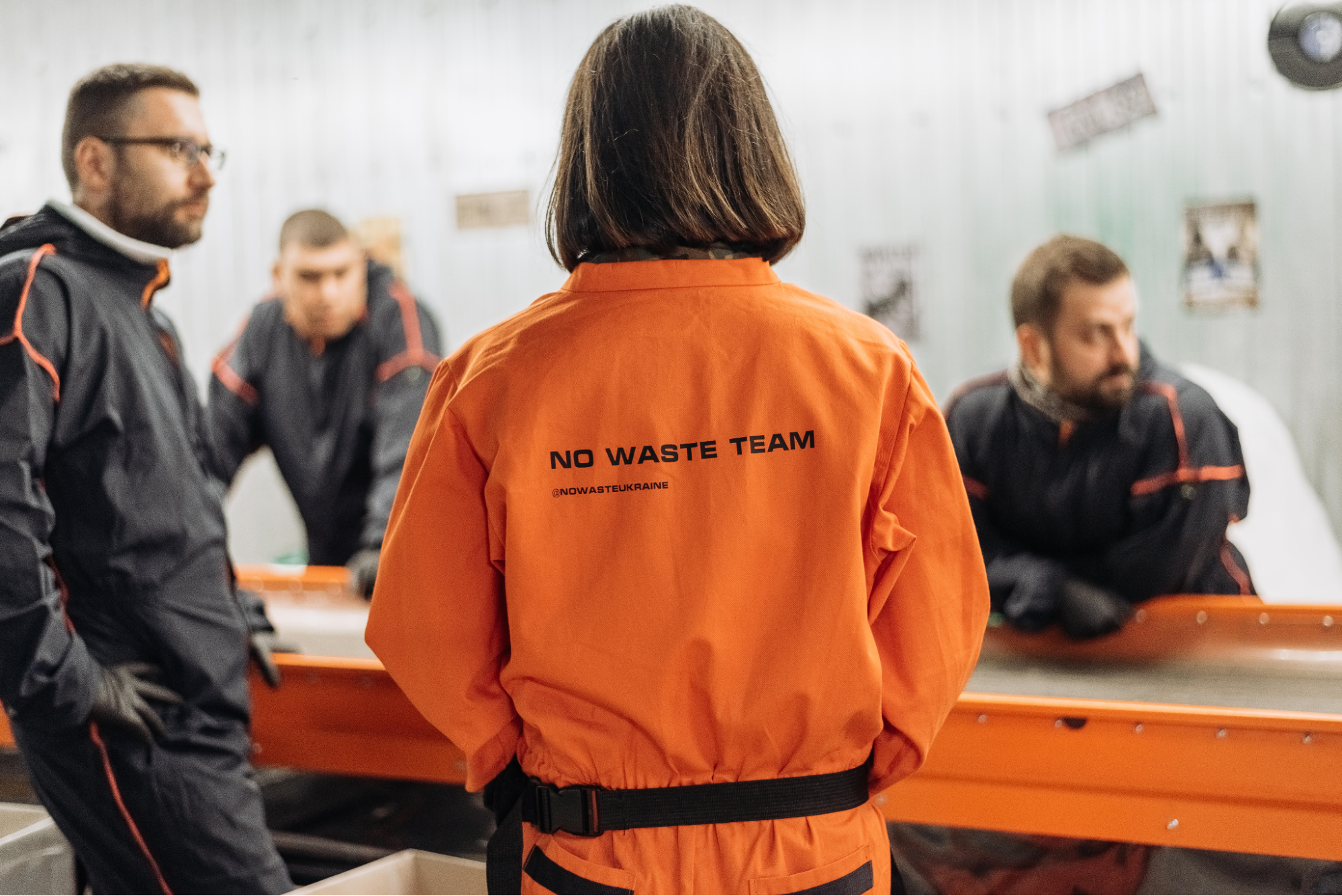
Employees of NWU and Yevhenia Aratovska. Photo provided by UBS
A workshop for tailoring plate carriers and bags instead of a sorting station at the Expocenter of Ukraine National Complex
It was planned to build a large waste sorting station with an educational space on the territory of the Expocenter of Ukraine in Kyiv. However, due to the war, the plans had to be postponed.
"We had a decent sum of money saved up for this project. We saved up for it over a good stretch: like cashback, Monobank, and a charity run, we saved up a good amount. Then, come March 2022, I thought we probably wouldn't ever kick off, but we had enough money to give us a boost. So, chances are we're just going to sit on it, like that dog on the haystack? That's when I decided to get a tailoring shop for bulletproof vests, pouches, and the like," Yevhenia said.
Ambitious goals helped to create collaborative relationships with partner projects. Along with "Have a Rest," a brand that makes suitcases and shoulder bags, they decided to purchase all the required supplies, textiles, and threads for sewing the targeted military devices in Kharkiv.
"At the same time, through acquaintances, I found a person who once owned a sewing shop. He had sewing space and equipment, but there were zero female sewists. And then I say: "Ihor, let's do a workshop because I have, firstly, the fabric, secondly, all the accessories, and you can sew the finished product," says Ms. Yevhenia.
The military administration needed things like this, so ten new seamstresses were added to the NWU team.
"For seamstresses to receive a salary, I crowdfunded 100,000 hryvnias in the first month. It was necessary to ensure all this at the first stage because the products were transferred free of charge to military units. Well, they already went out for regular orders but sold the products at a symbolic price to provide the seamstress with salaries. Let's say the products were sold for UAH 3,000, and our workshop sold them for UAH 500," says the head of the NWU.
This is how a new venture got up and running, and it's now starting to really take off and help everyone out. It's allowed many people to find employment and support their families during these trying times.
"We spent three months as if in a dream… How did we manage to get four major projects done – buying medicine, opening a sewing shop, offloading four trucks of feed, and setting up a help chatbot?" our heroine wonders.
Donations, evacuations, and "Hung up packages"
NWU didn't just stop there. Evhenia's "micro-projects" were also rolled out at the same time. But the scale of the work is quite impressive:
- The NWU team sold collages at the festival and collected funds for evacuating people from the Kharkiv region;
- They moved a shelter with animals from Vishneve to Germany;
- They donated all the collected cans to volunteers to make trench candles;
- They arranged "hung up packages" so that the volunteer staff could sort the trash.
"We were quite the team, and we pulled it off! We breathed a collective sigh of relief when we opened in May, not least because we adore our business and enjoy managing public sorting stations," said Ms. Yevhenia.
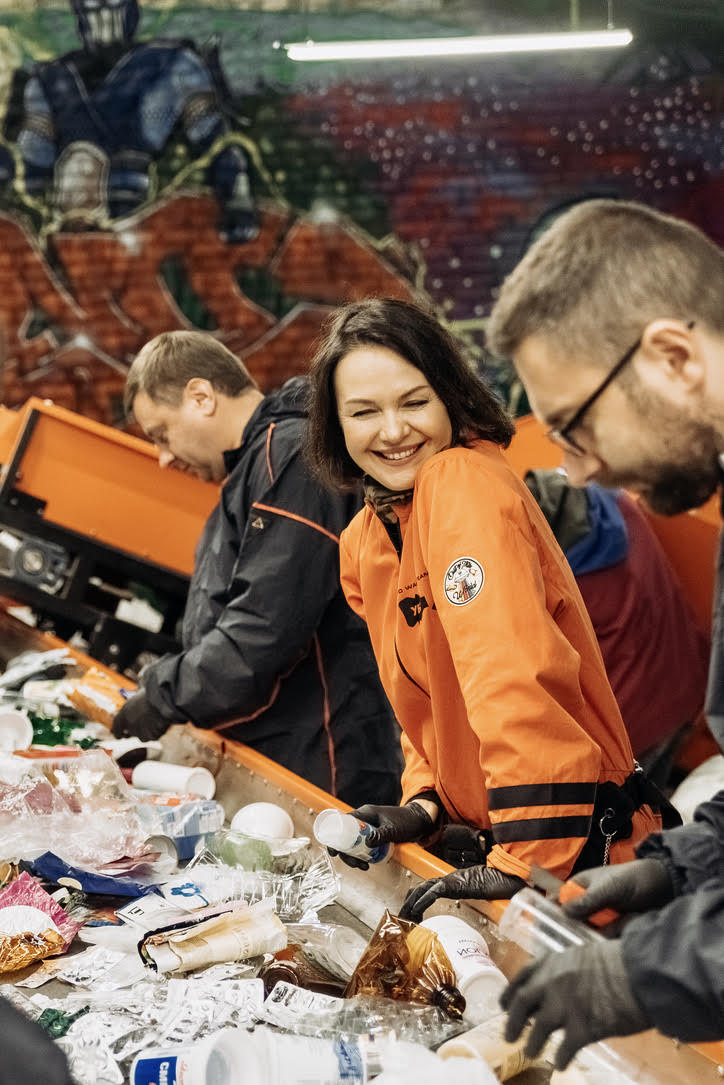
The process of "sorting" recyclables at the station. Photo provided by NWU
Recovery and new challenges
"To cope with the rental burden, we gave the area of our large station to the landlord and reopened in another warehouse at the same location. Many workers left, and many joined Ukraine's armed forces ranks, but because people's sorting activity also decreased, it was possible to provide service in a smaller area. Everything happened naturally," Yevhenia Aratovska said.
Therefore, it was figured out that waiting until September was the best option since it was seen that the station was getting enough people to cover its costs. However, NWU faced with new problems:
"When we adapted to the new realities, we realized that the demand is not abating. Of course, we also felt we needed to work with a new audience. These people were forced to move from less safe cities to Kyiv and do not know about us yet."
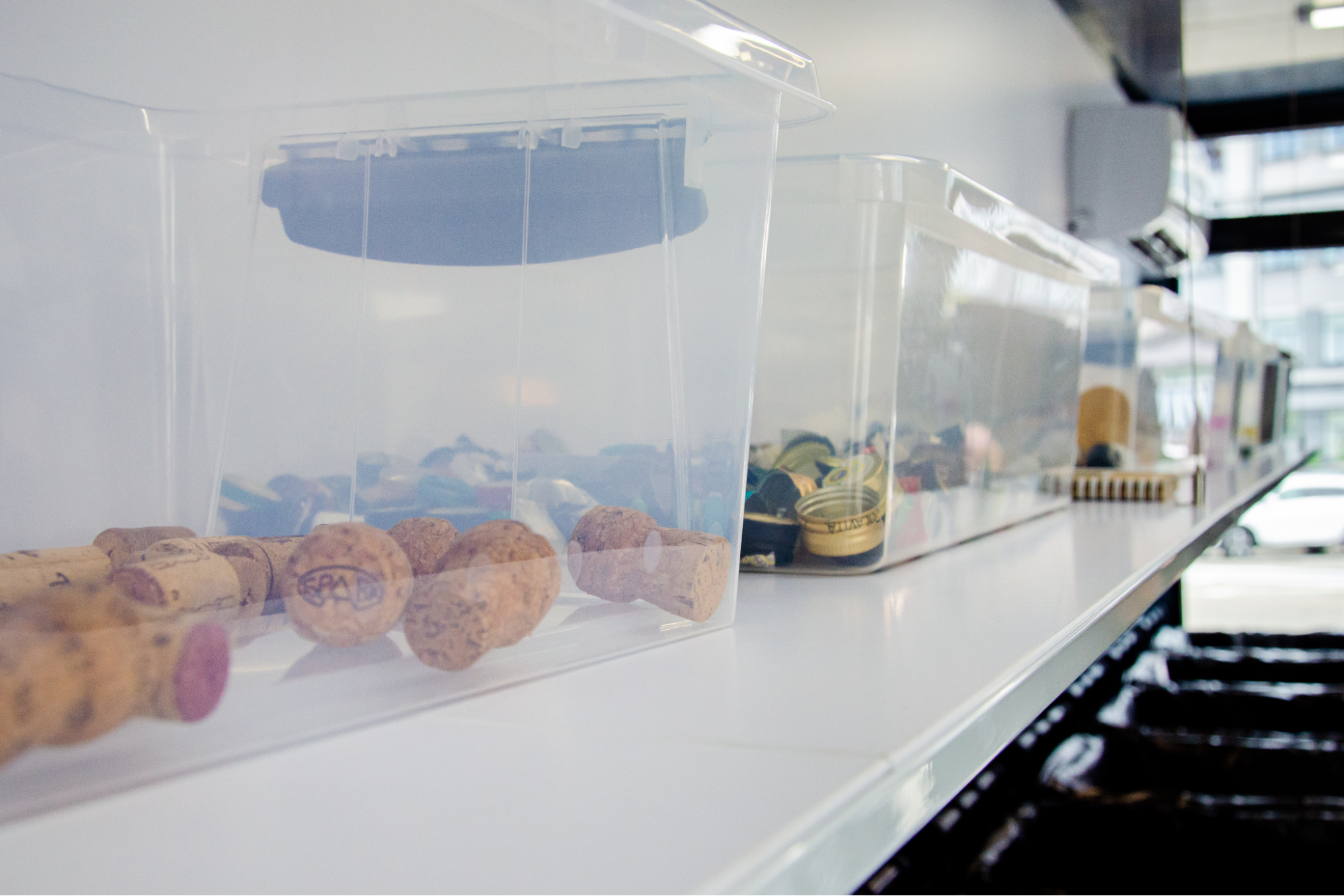
Containers for separate sorting. Photo provided by NWU
The sorting capsule sorts waste automatically
Yevhenia is thrilled to present an accomplishment that was achieved despite all the challenges: the launch of the "Sorting Capsule" pilot project. There are high expectations for it because it might greatly interest the global community.
This sorting mini station, created from a transformed shipping container and set up at Forum Business Center in Kyiv, features 25 containers for recyclables.
This format is special because it can totally run itself and doesn't need any people at the site. Anything that the system can't sort can be taken to the central station or recycled by the city's disposal system, like glass. Plus, if someone doesn't want to go all the way to Saperno-Slobidska Street, they can drop off packages at one of the same locations the sorting capsules are in.
People involved in capsule sorting get a full briefing from NWU. Plus, they join the No Waste Ukraine Club and contribute to cover the costs of organizing the space. The more people sign up for the club, the cheaper the fees will be in the long run. It's essential that members can access the capsule anytime they want – just open their smartphone app and press a button. Inside, the capsule is spotless and air-conditioned.
"Participants are now actively joining the capsule system. People living close by can easily come by while taking their dog for a walk and drop off whatever they need to sort, no matter how small the bag is. No more having to store bulky packages at home for ages. So, everyone living in a nearby complex should know the importance of sorting!" Yevhenia said.
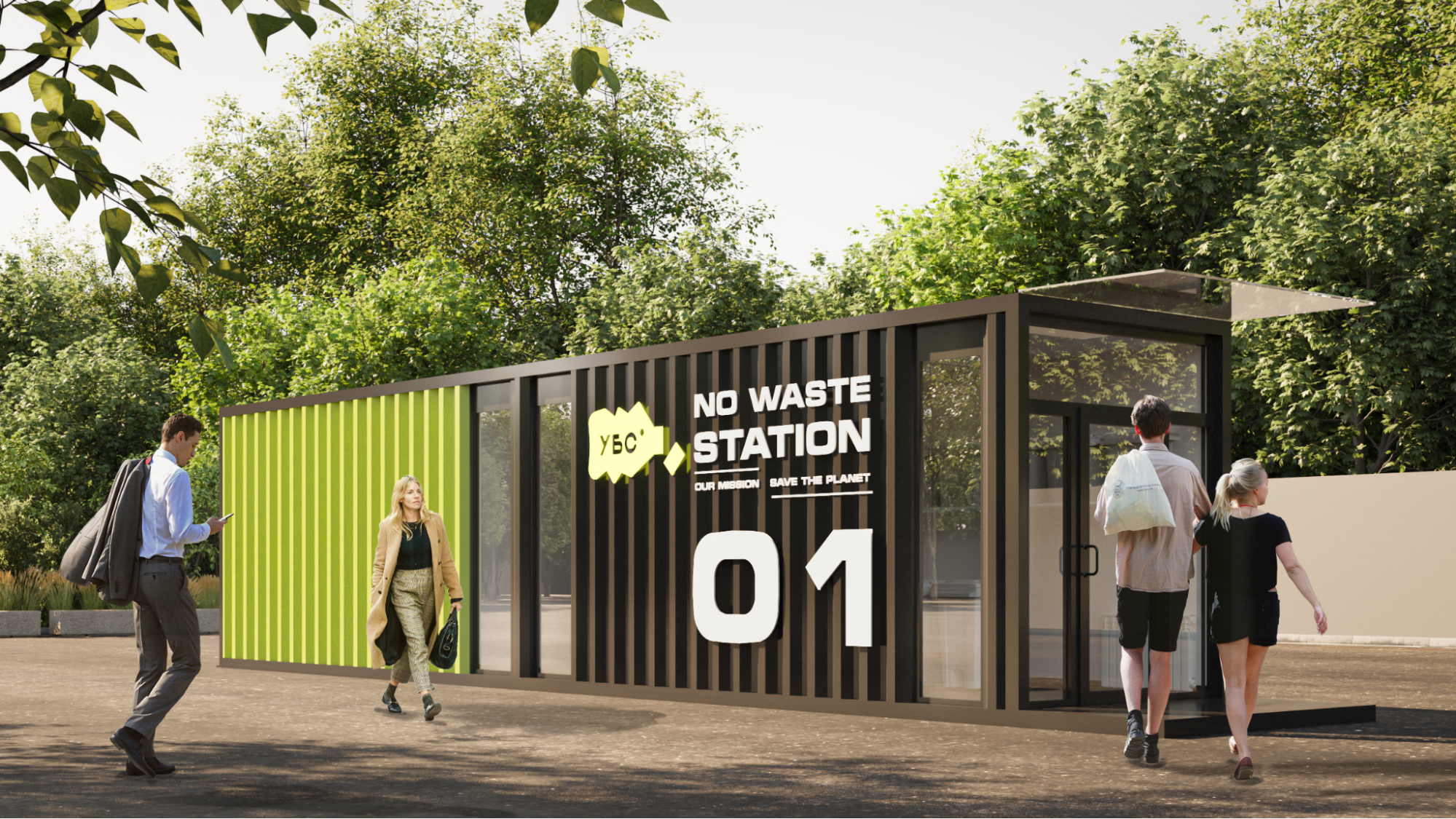
Sorting capsule. Photo provided by NWU
Does it really work?
Lack of managers and donations
"There is also such a problem as organizational capacity. That is because many people and many who serve in Ukraine's armed forces left Ukraine, it was not easy to find employees specifically for management positions in our organization. Sometimes it is tough to explain that this is a promising business and that these are not some toy projects. That we can do big tasks with big budgets," Yevhenia notes.
There is also an obvious problem that befell many people from the sector of social activities during the war – a significant decrease in donations. In NWU, their number decreased by three times.
"It's apparent that other projects are of no lesser importance, so people either donate less or spread out their donations. I'm not against trying to direct as many donations as possible to Ukraine's armed forces, as winning now is our utmost priority. We'll manage somehow, of course; we're always looking for ways to prevent closure," explains the head of NWU.
For instance, they started to produce their products – at the station, you can purchase a notepad crafted from dried-up leaves and reused plastic, plus a pot crafted from broken glass, which supports NWU's accomplishments. The well-known Ukrainian start-up RE-LEAF produces paper made from dried-up leaves. The inventor and founder of the start-up is presently studying in France, and the company is energetically selling its items on global markets. RE-LEAF make shopping bags for some of their most well-known customers, companies from the LVMH Group. Their NWU notebook includes pages with this paper and a cover made of recycled plastic – no two will be the same since the melted plastic particles are excellent in random patterns.
"It is beautiful, decorative, tactile; it has a delightful texture inside, you can draw with different liners, pencils, markers," Yevhenia demonstrates a beautiful product.
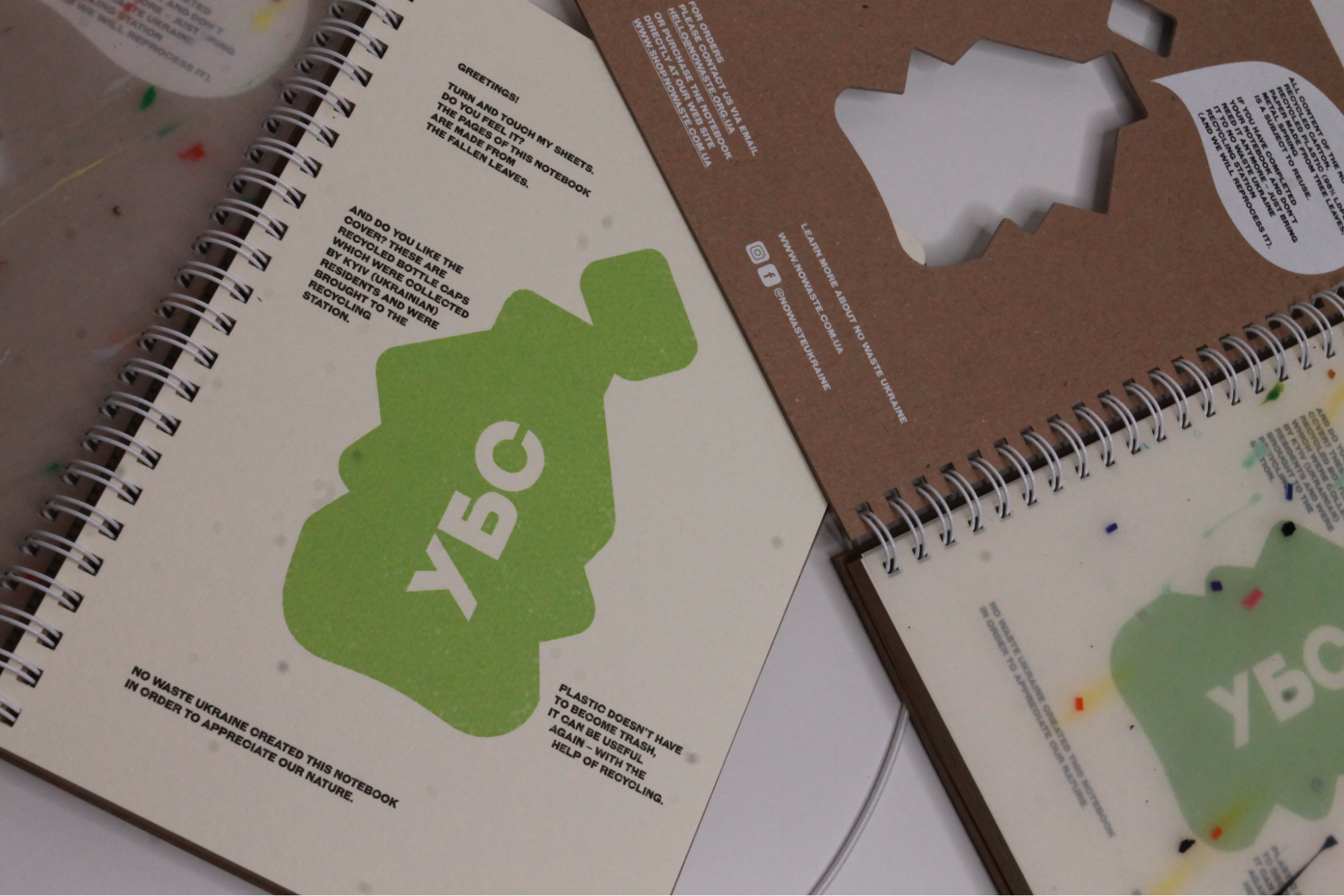
A notebook made of fallen leaves and recycled plastic. Photo provided by NWU
At the NWU store, you can get yourself a coffee cup, water bottles, shopping bags, and other non-plastic bags, books for both kids and grown-ups about living green, and even a bamboo toothbrush. You can buy these items directly from the Saperno-Slobidska Street sorting station or their online store. All proceeds from the sales go towards covering expenses at the sorting station and its improvement.
Is it on time to sort the garbage?
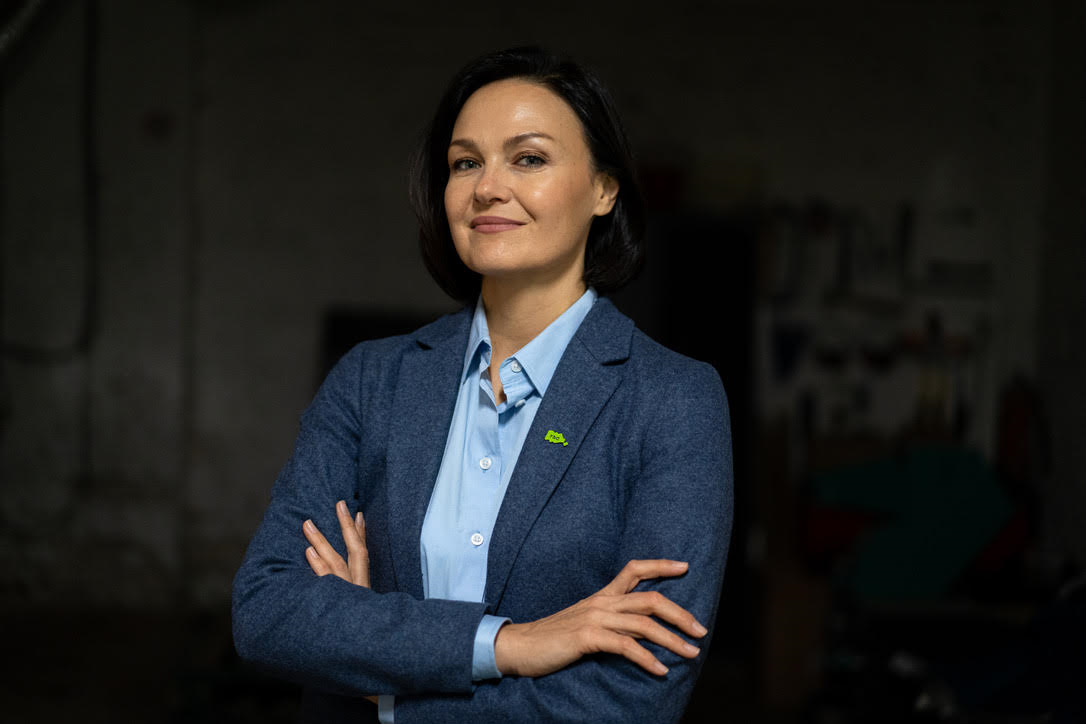
Eco-activist, social entrepreneur, and founder of NWU Yevhenia Aratovska
"Let's figure it out. Access to the EU is on time, but waste sorting is not on time? There is a misunderstanding here on the part of those who make a conditional division into important and less important cases during the war," says Ms. Yevhenia.
She points out that if we want to be part of the EU, we need to get used to European customs, and being mindful of the environment is a priority for Europeans. They also place great importance on culture and accountability.
Every little thing we do counts. It helps us feel in control of life and realize that our actions make a difference. This can be very healing for our minds. When there is a war and "missiles are flying," you seem to become small and vulnerable, and you cannot influence the end of the war, but you can do something that still matters and brings a visible result. Having that sense of control is reassuring. We strive to make our shared future as clean and European as possible – far removed from the understanding of the future by a barbarian aggressor country.
"Every minute is on time. Every action that brings us closer to EU values. Such a positive action distances us from the dung country that destroys, kills, and pollutes, which takes garbage from the capital all the way to the Arkhangelsk region! Are we like them? No! This revulsion must turn into action, into change. Even at the household level, at the level of your trash can, prove that the so-called"values" of the dung country have no place here!" – concludes Mrs. Yevhenia.
Olena Bakonina, Victoria Hubareva


